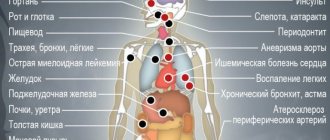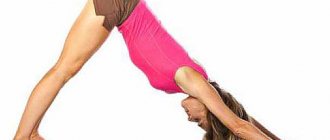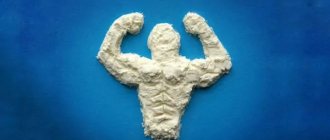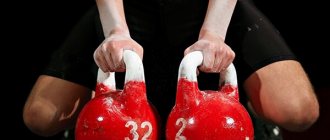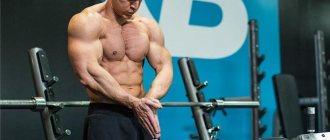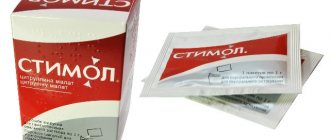Benefits of exercise
It has been proven that regular exercise can significantly improve and improve your health. Therefore, before moving on to the question of how to properly start playing sports, let's first talk about the benefits of exercise.
They help achieve and maintain healthy body weight, muscle mass and reduce the risk of developing chronic diseases.
On top of that, studies have shown that exercise improves your mood, boosts your brain, helps you sleep better, and increases your libido.
And that's not all - they help maintain good energy levels.
In short, exercise makes you strong and changes your life for the better.
Bottom Line : Exercise can improve your mental performance, reduce your risk of developing chronic diseases, and help you lose weight.
In a healthy body healthy mind
This ancient saying helps to understand physical education and sports as a path to self-improvement, as a means to enhance creative abilities. As already mentioned, sports ensure the normal functioning of the body, and this is invaluable for most people who have to sit at the computer much more often than move. Healthy regular physical activity (moderate, without exorbitant loads, of course) helps maintain vision, healthy musculoskeletal system, nervous system activity and good heart condition. This is good in itself, and is significant for creative people who will not be harmed by the sharpness of thinking, fullness of color perception, normal hormonal levels and the good mood of a healthy person.
Types of exercises
There are a huge number of different types of exercises. Here are the most common ones:
- Aerobic exercise: Typically the foundation of any fitness program, it involves periods of constant movement. Examples are swimming, running and dancing.
- Strength: Helps increase muscle strength and endurance. Examples include resistance exercises, plyometrics, weight lifting and sprinting.
- Rhythmic gymnastics: Basic body movements performed without the help of machines at an average aerobic pace. Examples are lunges, squats, push-ups and pull-ups
- High-intensity interval training (HIIT): Involves alternating short periods of high-intensity exercise followed by low-intensity exercise or rest.
- camp exercises : Time-controlled, high-intensity exercise routines that combine aerobic and resistance exercises.
- Stability exercises: Strengthen muscles and improve coordination. For example, Pilates, Tai Chi poses and general strengthening exercises.
- Flexibility exercises: Help restore muscles, improve coordination and prevent injuries. Examples of such exercises are yoga or individual muscle stretching movements.
The exercises listed above can be performed individually or in combination. The main thing is that this or that exercise suits and pleases you.
Conclusion: The most common types of exercises are aerobic exercises, strength training, rhythmic gymnastics, HIIT, boot camps, exercises to develop flexibility and stability. You can perform them individually or in combination.
Physical activity is the main function of a living organism
Many modern people believe that the main specificity of human life is success in society, in business, the ability to communicate, involvement in spiritual values, and the ability to learn. And they forget about regular physical activity. But the basis of human life is a biological factor, this is anatomy and physiology. Of course, the activity of the mind is not reducible to neurophysiology, but at the same time it is absurd to deny that the healthy development of the human body represents a necessary basis for its psychological and spiritual activity.
And in this regard, the truth established by biologists and doctors a long time ago is important. An organ of the body whose function is not in demand ceases to work at full capacity, degrades and its tissues atrophy. If a person does not strain his muscles, they do not develop, but on the contrary, they dry out and weaken. But that's not so bad. The real trouble is that in parallel with this, blood circulation in muscle tissue worsens, the amount of adipose tissue increases, neuromuscular coordination worsens, that is, muscle atrophy is accompanied by degradation of the nervous system, cardiovascular, musculoskeletal system, and the brain is less well supplied with oxygen and who does not receive stimulus in the form of nerve impulses from the muscles, also begins to work worse and his ability to resist the aging process, various diseases such as Alzheimer’s, etc. decreases.
This leads to the inevitable conclusion: in order to live and be healthy, the body must act. It is biologically conditioned that a person should be able to run, jump, hang and pull himself up, bend over, lift something, squat and do push-ups - these are the simplest biological movements that implement the functions of our body. If they are not implemented, the body weakens, degrades and is affected by various diseases.
Where to start?
Your sports journey begins here. There are a few important things to consider before you start training:
Check your health
Preparation for such an important stage of your life must be thorough. If you decide to take up sports seriously, then first consult your doctor and undergo a full medical examination.
This is the main condition for those who are not used to physical activity, as well as for people in the age category 45+.
A timely examination will identify any health problems that may increase the risk of injury during exercise.
A visit to your doctor will help further optimize your training and make it easier for you and your trainer to choose the right training program.
Make a plan and set realistic goals
Once you have decided to start exercising on a regular basis, try to create a plan that will consist of goals and ways to achieve them. So, how to start exercising at home from scratch?
Start with simple activities and goals and increase complexity as your fitness level improves.
For example, if your goal is to run 5 kilometers, then you can add a few shorter distances to your plan to start with.
Once you've mastered the shorter distances, add more meters until you've completed all five kilometers at once.
If you start with small and achievable goals, you will increase your chance of success, which will motivate you throughout your journey.
Make exercising a habit
Another key component to a successful start, and equally important, is that you need to find time to exercise and make it part of your schedule.
This will be easier to do if exercise becomes a habit and takes place on a regular basis. This will train you to be disciplined and responsible.
According to research, replacing one bad habit with another healthy one ensures that the new habit will enter your life and become a part of it for a long time.
Moreover, if you create a schedule or exercise every day at the same time, for example every day after work, this will allow you to turn training into something familiar.
Conclusion : Before you start exercising, check your health and create a plan with achievable goals.
Then turn exercise into a habit by incorporating it into your daily routine and life.
Playing sports changes people
Sounds very serious? But this is how it is, because training is, first of all, an activity that is performed by educating oneself, which is why not only physical but also mental qualities are improved, self-discipline improves, self-confidence increases, and so on. It is during training that we set new goals for ourselves over and over again and persistently achieve them. We begin to feel inner harmony with ourselves and our body. Regular training brings a new level of stress resistance, endurance and mental strength. Playing sports is self-respect, self-perception; a person begins to act based on his own interests, without thinking about what others will say and think. However, there is also the other side of the coin: having missed a workout, a person begins to experience anxiety, irritation, and scolds himself. A new round of depression may begin here.
We have figured out how sports affects human health, now the decision is yours.
How many exercises should you do?
You don't have to be a high-performance professional athlete or accustomed to hours of training to start exercising today.
According to the American College of Sports Medicine and Exercise Medicine, 150 minutes of moderate aerobic exercise per week is sufficient.
You can distribute these 150 minutes yourself according to the days of the week, as is most convenient for you, that is, when it is best to exercise, you decide for yourself. For example, you can exercise for 30 minutes 5 times a week or 35-40 minutes every other day.
Recent research has shown that spending 150 minutes in the gym at a time or two can be just as beneficial for your health and well-being as working out daily at home or exercising every other day.
Your workouts should start at a moderate pace, gradually increasing in intensity as your fitness level improves.
Lastly, even though daily exercise is essential to good health, it is also important to give your body proper rest.
If the body is not given time to recover and rest, then the risk of injury (stress fracture, muscle strain) and overtraining syndrome increases several times.
Exercising too intensely can weaken your immune system and increase your body's susceptibility to infections, hormonal imbalances, depression and chronic fatigue.
Conclusion : The minimum recommended training time per week is 150 minutes.
You shouldn’t try to do everything quickly and train a lot at once. Remember, this is entry level. It is also important not to forget about rest.
Why is it so important to exercise?
Technological progress does not stand still; a variety of gadgets are firmly integrated into our lives, which make life much easier, and, as a result, people’s physical activity is significantly reduced. This trend can clearly be traced even in the last decade. On the one hand, humanity can be applauded, because the world is developing and progress does not stand still. The importance of sport for human health is very significant.
Weekly training program
Where to start training and when is the best time to exercise?! Below is an example of a simple weekly workout program that does not require the use of additional equipment and will take 30-45 minutes a day. It will give you a rough idea of how to get started from scratch and help you create your own fitness program.
It can be changed depending on your level of physical fitness and complicated as desired. It can start with any type of exercise.
Monday: 40 minutes of moderate jogging or brisk walking.
Tuesday: Rest day.
Wednesday: Brisk walking for 10 minutes. Next, perform the set of exercises below, resting for a minute after each set, not exercising. After that, stretch.
- First set of exercises: 3 sets of 10 lunges on both legs, 10 push-ups, 10 sit-ups from a supine position
- Second set of exercises: 3 sets of 10 chair push-ups, 10 stretches, 10 air squats
Thursday: Rest day.
Friday: 30 minutes cycling or jogging at a moderate pace
Saturday: Rest day.
Sunday: Run, jog or take a long walk for 40 minutes.
This program is just a simple example of how to start training from scratch.
Conclusion: There are a wide variety of exercises that you could easily do. The workout plan above is provided as an example to give you a general idea of where to start exercising at home.
Sports and the nervous system
The influence of sport on the nervous system is equally obvious. Moderate physical activity improves the functioning of the central nervous system. Blood circulation is activated, blood oxygen saturation increases. During sports, new connections are formed between neurons. Sport strengthens the nervous system, improving neuromuscular coordination, which determines the accuracy and speed of movements. Each movement is gradually being mastered, even those that were initially difficult, after a while they become easy and relaxed. Moreover, the more complex movements have to be performed, the more actively the brain is involved in its work, successfully resisting the aging process and the effects of adverse factors.
In some cases, to increase the effectiveness of exercise, it is necessary to use stimulants in sports that act on the nervous system. This is primarily caffeine - in small doses it is a completely safe natural stimulant for a healthy person. It increases vigor, improves memory and coordination, promotes better concentration, and gives a feeling of energy flow. To some extent, substances such as acetyl-L-carnitine, extracts of Rhodiola and Schisandra, and omega-3 have a slight stimulating effect. Stimulants should be used very moderately to avoid overstrain and overload of the nervous and cardiovascular systems, as well as to eliminate the addictive effect.
Some tips for beginners
Consume the required amount of fluid
Drinking fluids throughout the day is very important to maintain adequate fluid levels in the body.
During training, it is also important to drink enough fluids to maintain an optimal pace of work, especially if it is also hot outside.
After a workout, you should also drink a lot of water, as it helps the body recover faster for the next workout.
Optimize your nutrition
Make sure your diet is balanced enough to meet your body's nutritional needs.
All food groups are necessary to maintain optimal energy levels in the body and get maximum benefit from your workouts. Carbohydrates are especially important because they fuel your muscles before exercise.
Carbohydrates are also important post-workout as they replenish glycogen stores and aid in the absorption of amino acids into muscles during muscle recovery.
Protein protects your muscles from destruction during physical activity, repairs damaged tissue after exercise, and promotes muscle growth. Consuming certain proteins after exercise speeds up the muscle recovery process.
And finally, regular consumption of “healthy” fats helps fight excess weight, and these fats are also a source of energy for muscles and the body as a whole during training.
Every beginner should know and remember this.
Warm-up
Before starting any workout, be sure to warm up. Warming up significantly reduces the risk of injury during training and improves your athletic performance.
It increases body flexibility and reduces post-workout pain.
Simply start your workout with simple aerobic exercises such as arm swings, leg curls and walking lunges.
You can warm up using simplified versions of the exercises you'll be doing during your workout. For example, walking before running.
Hitch
Cooling down is also important as it helps the body return to its normal state. This is essentially just a short break, but it is just as necessary as a warm-up.
A few minutes of cool-down restores normal blood circulation and breathing, reducing the risk of pain after exercise.
After doing, for example, aerobic exercises, you can simply walk slowly, and after doing resistance exercises, you can do stretching exercises.
Listen to your body
If you are not used to exercising every day, then be aware of your limits.
If you feel pain or discomfort during an activity, stop, there is no need to force yourself to do something you don't like. Rest before exercising again. Training through pain is not a good idea as it can lead to injury.
Remember also that training harder and faster does not mean better.
It will take a long time before you can achieve truly visible and tangible results. Just stick to your chosen training program and try to complete at least most of it.
Conclusion : Drink enough fluids, eat a balanced diet, warm up before and cool down after, listen to your body and learn to love yourself.
The influence of sport on human health
The technological progress of mankind, the emergence of modern technologies , ranging from a car to an elevator in the entrance, literally forced people to lead a sedentary lifestyle. As a result, among the world's population, more people with excess fat , which has given rise to many diseases, both musculoskeletal and problems with the cardiovascular system.
The role of sport in the modern rhythm of life is very high. Below we list all the main positive aspects of regular sports or physical exercise (just don’t confuse professional sports, as they have no place for health, but you can always dose out physical activity in any sport).
Increased endurance and muscle strength
Active physical activity of a forceful nature causes microtrauma to muscle fibers; as a counteraction, the body begins to actively synthesize proteins, as a result of which the muscles become larger and stronger.
During aerobic training , an increased flow of oxygen to the muscles actively saturates all human tissues, due to which the network of capillaries , the ability to oxidize lipids and carbohydrates increases, the level of myoglobin increases, the ability of mitochondria to oxidative resynthesis of ATP increases, and as a result, the muscles become more resilient .
In addition, sports activities that dynamically or statically fill muscles with blood help heal injuries to tendons, ligaments and joints, due to the fact that blood from the digestive organs delivers oxygen and nutrients to the damaged area, taking away decay products.
Increased endurance and muscle strength
Nervous system development
Improved coordination of movement, increased attention, concentration of effort, speed and dexterity in movements create new nerve connections in the brain, thanks to which a person begins to respond to external stimuli much faster in everyday life. This is especially important at a young age, when brain is just forming, which is why we strongly recommend sending your child to a sports section.
Development of the athlete's nervous system
Strengthening the cardiovascular system
Adequate loads on the body, in which the pulse does not exceed 85% of the maximum, have a beneficial, health-improving effect on the heart muscle, stretching its walls, making them elastic , which is why the heart beats less in a calm state, which is why it wears out less.
Cardiovascular system and sports
Keep in mind that the more muscles a person has, the more force the blood must be pushed into the heart to wash them, which is why this is one of the reasons why overly hypertrophied muscles have nothing to do with health.
Dosed, correct sports activities will reduce the risk of stroke , heart attack, and increase the elasticity of blood vessels in the body.
Development of the body's respiratory system
The development of the respiratory system is directly related to active, aerobic activity (swimming, long-distance running, rolling pin, cycling). Thanks to which the endurance of such an athlete increases, at the same time the vital capacity of the lungs (the amount of air that the lungs can accommodate after a full exhalation).
Development of the body's respiratory system
Boosting immunity
Moderate sports activities help stimulate the immune system , protect the body from the effects of various microorganisms, viruses and substances that have a destructive effect on cells , reducing their functional activity.
Thanks to physical activity, the level of leukocytes in the blood, neutrophils, NK cells , monocytes, and also the level of cytotoxic T-lymphocytes increases slightly.
However, if you do not approach your sports activities correctly, immunity can be lost, mainly due to overtraining , that is, when the loads in the gym exceed the body's recovery abilities.
Therefore, any training must be properly planned , that is, taking into account the body’s adaptive abilities to physical activity, especially when it comes to intense aerobic or anaerobic training.
Protecting the body's immune system
Increased metabolic rate
Metabolism is, first of all, all the biochemical reactions occurring in the body that maintain its viability.
And as everyone knows, sports activities, depending on the type, some help build muscle mass (anaerobic, strength), others increase endurance, help lose weight (aerobic), create stress for the body, as a result of which it is forced to adapt to external conditions, that is, increase muscles, strength, improve oxygen delivery to muscles, all this is reflected in the processes of anabolism , which is responsible for the formation of new high-molecular cells (for example, in bodybuilding this is the synthesis of proteins or proteins).
In addition, increasing the metabolic rate through regular training associated with aerobic activity (swimming, running, jumping, skiing, etc.) entails inevitable loss of fat mass , which will naturally have a positive effect on a person’s figure.
Also, do not forget that sport is a way of life , and it does not stop at just exercises in the gym, it is also a proper and balanced diet, without which you cannot be healthy and fit.
Sports and metabolism
How to stay motivated
So, that's a start, but to stay motivated and make exercise a habit, try to approach your workouts with ease and positivity and really enjoy the process. This approach will relieve you of anxious thoughts and fears that often arise in people who decide to start training from scratch.
You can adjust and change any program for yourself and depending on your preferences and desires.
If you're not a home person, then go to the gym, join a fitness group (yoga or Pilates), hire a personal trainer, take up a team sport, or pick a favorite sport. These are just a few options that will help increase your motivation and enjoyment of exercise.
If you train with a group or a friend, it will push you to work at a good pace, due to indirect competition, increase your motivation for a longer period and help you become confident in your abilities.
Keeping track of your progress, such as recording the weight you lift or the time you run, will also keep you motivated, as you'll want to beat your personal best.
Conclusion : To stay motivated, tailor your training plan to suit yourself, join a team or group of like-minded people and track your results, then you will have no questions about how to fall in love with sports.
What are the consequences of a lack of sports?
However, there is also the other side of the coin - such a passive lifestyle leads to a decrease in a person’s functional abilities, the skeleton, muscles weaken, and even the functioning of internal organs changes. Lack of activity in life leads to the disruption of the functioning of all organ systems and the human body as a whole suffers. This is where a variety of diseases begin to develop. That is why the role of sport in human health is great. At a minimum, because physical activity is almost the only way available to us to satisfy the natural need for movement and exercise. Human health and sports, no matter what, are very interconnected concepts.
Which sport should I choose?
If you want to play sports, you need to take into account several important features.
Financial opportunities
Sport is an expensive pleasure. Classes often require special clothing and, in some cases, equipment with a hefty price tag. Don’t forget about paying for classes with a coach and mentor, regularly purchasing a subscription and going to various sports sections.
Taking into account the fact that such activities require serious material investments, it is necessary to carefully consider whether this is really necessary and whether such an investment is justified. Sometimes amateur activities are a more successful and expedient approach to the matter. A treadmill in the gym can easily be replaced by a street, which is much healthier, and exercise machines are horizontal bars, which are located in almost every yard.


